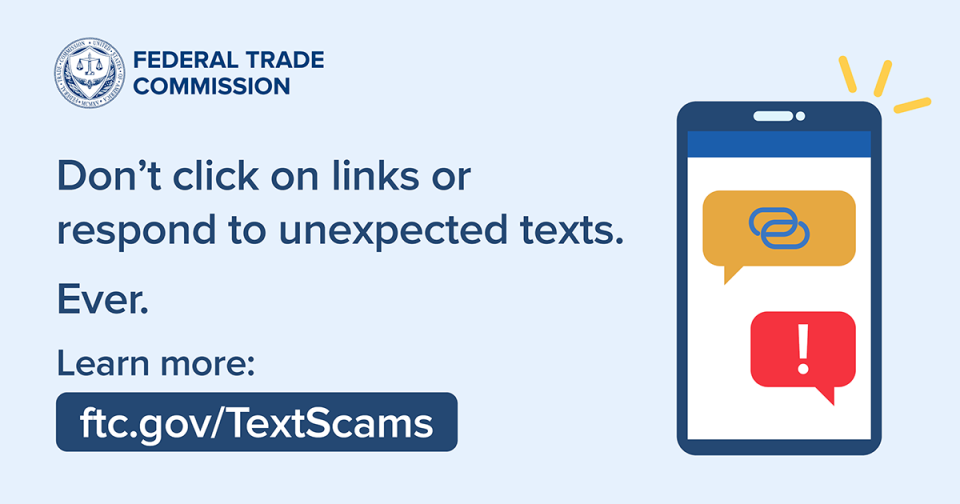

If you get tons of scam text messages, you’re not alone. Lots of people have been reporting to the FTC that they’re getting texts from scammers impersonating people and organizations you know and trust — like your bank or companies like Amazon. An analysis of consumer reports reveals the top text scams from 2022. So, what are they? And how do you avoid them?
The latest FTC Data Spotlight explores how text scams try to get you to act NOW. Whether it’s the thrill of getting a free item or the panic about a large unauthorized charge, scammers know that these texts are hard to ignore. The most-reported text scam looks like a fraud alert from your bank, but it’s fake. It might say there’s suspicious activity on your account and tell you to call a number. Or to reply “yes or no” to confirm a big purchase (that you didn’t really make). But don’t do it. There is no real problem. They just want your money or personal information.
Another common text scam promises a “free gift”— if you click a link. But then they ask you for payment information to cover the “shipping cost.” If you give it, you’ll get unauthorized charges on your account…and no free gift.
So how do you avoid these and other text scams?
And if you spot a text scam, the FTC wants to hear about it. Tell us what happened at ReportFraud.ftc.gov.
Comments have been turned off for this consumer alert.It is your choice whether to submit a comment. If you do, you must create a user name, or we will not post your comment. The Federal Trade Commission Act authorizes this information collection for purposes of managing online comments. Comments and user names are part of the Federal Trade Commission’s (FTC) public records system, and user names also are part of the FTC’s computer user records system. We may routinely use these records as described in the FTC’s Privacy Act system notices. For more information on how the FTC handles information that we collect, please read our privacy policy.
The purpose of this blog and its comments section is to inform readers about Federal Trade Commission activity, and share information to help them avoid, report, and recover from fraud, scams, and bad business practices. Your thoughts, ideas, and concerns are welcome, and we encourage comments. But keep in mind, this is a moderated blog. We review all comments before they are posted, and we won’t post comments that don’t comply with our commenting policy. We expect commenters to treat each other and the blog writers with respect.
We don't edit comments to remove objectionable content, so please ensure that your comment contains none of the above. The comments posted on this blog become part of the public domain. To protect your privacy and the privacy of other people, please do not include personal information. Opinions in comments that appear in this blog belong to the individuals who expressed them. They do not belong to or represent views of the Federal Trade Commission.